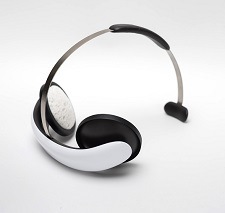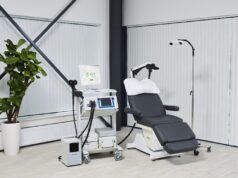
Flow Neuroscience, which claims to be the creator of Europe’s first medically approved brain stimulation device to treat depression at home, has received full US Food and Drug Administration (FDA) investigational device exemption (IDE) to launch a US pivotal trial using its self-managed transcranial direct current stimulation (tDCS) headset in the treatment of major depressive disorder.
In the largest trial to date with a portable device using tDCS for depression—according to Flow—the results could see this depression treatment be readily accessible for US populations and pave the way for healthcare system inclusion in the UK. This will provide a widely available option for reducing depressive symptoms that does not rely solely on medications, the company claims in a press release.
The clinical trial will include 270 participants, across two research centres, UTHealth (Houston, USA) and UEL (London, UK), with the former being led by Sudhakar Selvaraj (University of Texas, Houston, USA) and the latter by head principal investigator Cynthia Fu (University of East London, London, UK) with co-researcher Allan Young (King’s College London, London, UK).
Selvaraj said: “This is a key trial for gathering more clinical evidence for tDCS delivered through a portable device. As a promising non-pharmaceutical treatment for depression, these results would mean that we can work towards offering an alternative for patients and reach the 27 million US adults who remain untreated.”
Promising results
Depression is associated with lowered activity in the dorsolateral prefrontal cortex, located in the frontal lobe of the brain. TDCS delivers gentle electrical signals to restore activity in brain cells, resulting in a reduction of depressive symptoms. Flow combines tDCS and behaviour therapy in a headset and smartphone app-based treatment programme designed for at-home use. Since launching in the UK in 2019, Flow has gained more than 2,000 active patients every month, with 81% experiencing a reduction in their symptoms in the first three weeks of the treatment programme, according to the release.
The University of East London conducted a pilot study prior to launch, with strong results. “Our initial investigations have shown promising remission results in participants with major depressive disorder,” Fu explained. “This led us to want to further explore the implications of this type of treatment on a larger scale. To be able to deliver a brain stimulation technique such as tDCS in an accessible manner offers a potential new first-line treatment for depression.”
About the trial
“This trial is a pinnacle moment for the tDCS community as we embark on gaining large-scale data for the use of brain stimulation in a portable device,” added Flow co-founder Daniel Månsson. “The results will open the doorway for clinicians, researchers and those suffering from depression to access a validated technique in a completely autonomous way, facilitating more treatment and research than ever before.”
Delving into the efficacy of using tDCS to treat depression through a portable device, the trial will see participants follow a treatment plan over 10 weeks where they will have five stimulation sessions per week in the first three weeks and two stimulation sessions per week in the next seven weeks. A tDCS session lasts around 30 minutes—and previous studies have indicated this protocol as safe and effective at reducing depression symptoms, according to Flow. The trial is being powered by virtual clinical trial platform Curebase, with the intention of propelling efficiency as researchers and participants have regular virtual meetings and clinical assessments to follow symptom progression, both anecdotally and using standardised measurements.
This follows a Flow announcement from last month, which detailed that Erin Sivyer—formerly of Babylon Health, Uber and Google—had been appointed as the company’s new CEO.









